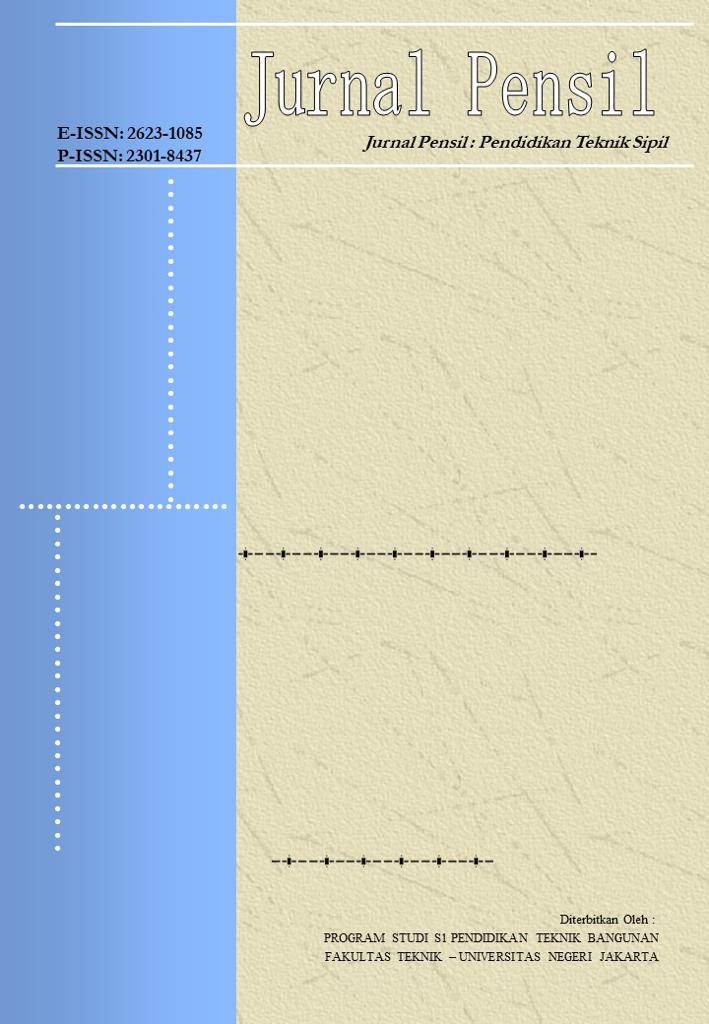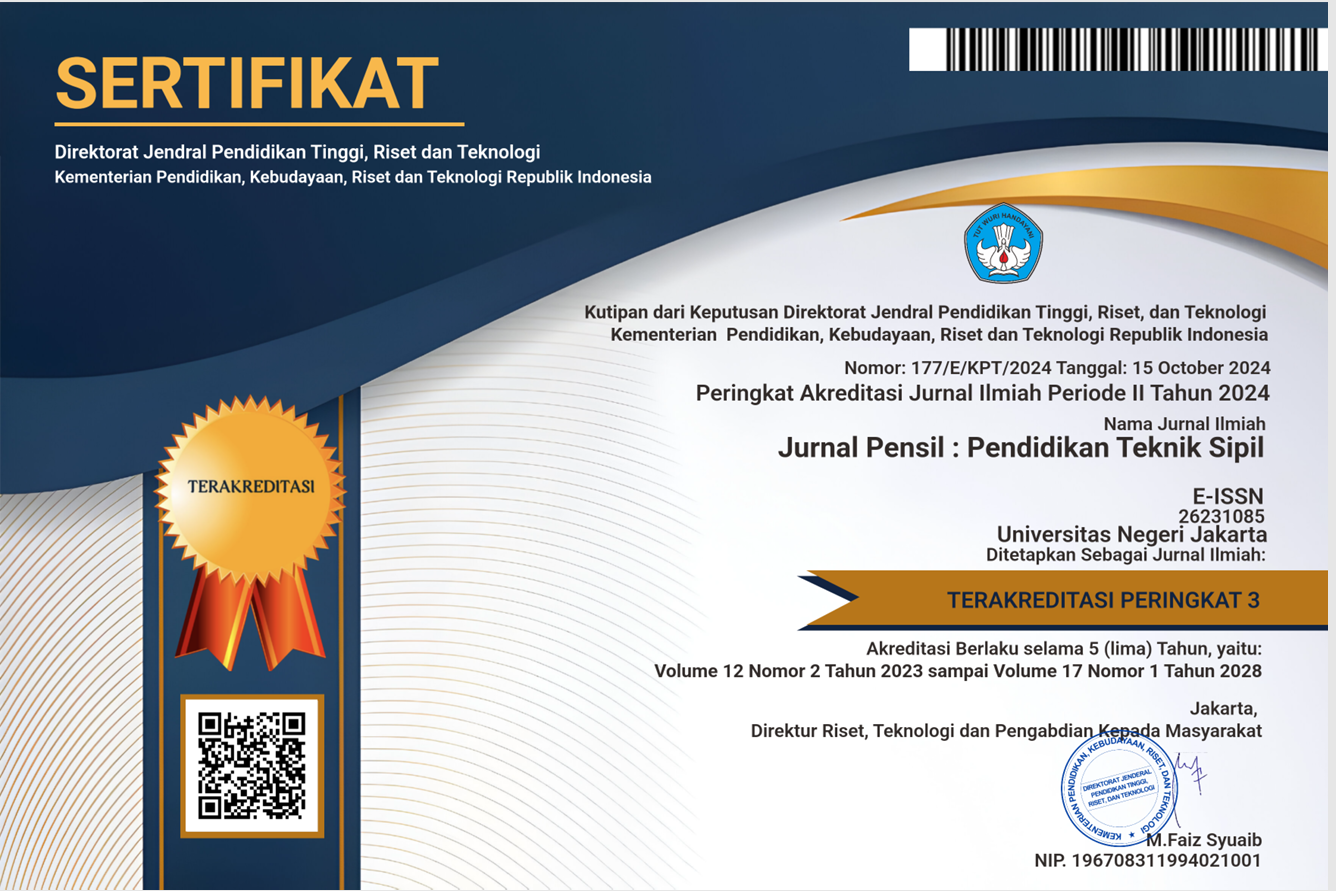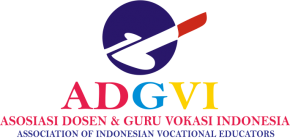ANALYZING TRANSFERABLE SKILLS OF VOCATIONAL STUDENTS TO ALIGN WITH INDUSTRY DEMANDS
DOI:
https://doi.org/10.21009/jpensil.v13i1.39803Keywords:
Industry, Hard Skill, Soft Skill, VUCAAbstract
The rapid development of the world in the VUCA (Volatility, Uncertainty, Complexity, and Ambiguity) era has led to changes in various sectors, including the education sector. According to the Indonesian Central Statistics Agency (BPS) in August 2022, Vocational High Schools contribute the highest unemployment rate of 9.42% compared to other educational levels. Therefore, this research aims to analyze the level of Transferable Skills, which refers to skills that can be transferred and consistent in continuous learning, among Vocational High School students and their fulfillment of the needs of the working industry. The method used in this research is descriptive quantitative with a survey technique through a cross-sectional approach to gather information. The instruments used in this study consist of questionnaires distributed to vocational high school students in Indonesia who have undergone job training and supervisors in the industry where the students conducted their job training in various regions in Indonesia. The findings of this research indicate that, overall, the vocational high school students have a satisfactory level of Transferable Skills. However, there are still several aspects that need improvement. This research contributes significantly to understanding the level of transferable skills among vocational high school students and the needs of working industry in the VUCA era. The results of this study can serve as a basis for the development of more effective and relevant vocational education programs to prepare students to meet the demands of an increasingly complex and dynamic job market.
References
Ana, A. (2020). Trends in expert system development: A practicum content analysis in vocational education for over grow pandemic learning problems. Indonesian Journal of Science and Technology, 5(2), 246–260. https://doi.org/10.17509/ijost.v5i2.24616
Ana, A., Alhapip, L., Syaom Barliana, M., Rahmawati, Y., Muktiarni, & Dwiyanti, V. (2020). Transferable skills needed in the workplace. Journal of Engineering Education Transformations, 34(Special Issue), 95–101. https://doi.org/10.16920/JEET/2020/V34I0/157858
Anbarini, R., & Rogeleonick, A. (2021). JENDELA Pendidikan dan Kebudayaan.
Apriana, D., Kristiawan, M., & Wardiah, D. (2019). Headmaster’s competency in preparing vocational school students for entrepreneurship. International Journal of Scientific and Technology Research, 8(8), 1316–1330.
Arifin, S., & Muslim, M. (2020). P-issn 2620-861x e-issn 2620-8628. Jurnal Pendidikan Islam, 3(1), 1–11.
Arifin, Z., Nurtanto, M., Warju, W., Rabiman, R., & Kholifah, N. (2020). The tawock conceptual model at content knowledge for professional teaching in vocational education. International Journal of Evaluation and Research in Education, 9(3), 697–703. https://doi.org/10.11591/ijere.v9i3.20561
Azman, A., Simatupang, W., Karudin, A., & Dakhi, O. (2020). Link and match policy in vocational education to address the problem of unemployment. International Journal of Multi Science, 1(7), 76–86. https://www.multisciencejournal.com/index.php/ijm/article/view/78
Azmi, I. A. G., Hashim, R. C., & Yusoff, Y. M. (2018). The Employability Skills of Malaysian University Students. International Journal of Modern Trends in Social Sciences, 1(3), 1–14.
Bakos, J. D. (1997). Communication skills for the 21st century. Journal of Professional Issues in Engineering Education and Practice, 123(1), 14–16. https://doi.org/10.1061/(ASCE)1052-3928(1997)123:1(14)
Barrera-Osorio, F., Kugler, A. D., & Silliman, M. I. (2021). Hard and Soft Skills in Vocational Training: Experimental Evidence from Colombia. SSRN Electronic Journal. https://doi.org/10.2139/ssrn.3658843
Campion, E. D. (2018). The career adaptive refugee: Exploring the structural and personal barriers to refugee resettlement. Journal of Vocational Behavior, 105, 6–16. https://doi.org/10.1016/j.jvb.2017.10.008
Caspersen, J., Smeby, J. C., & Olaf Aamodt, P. (2017). Measuring learning outcomes. European Journal of Education, 52(1), 20–30. https://doi.org/10.1111/ejed.12205
Collins-Nelsen, R., Koziarz, F., Levinson, B., Allard, E., Verkoeyen, S., & Raha, S. (2022). Social context and transferable skill development in experiential learning. Innovations in Education and Teaching International, 59(4), 421–430. https://doi.org/10.1080/14703297.2021.1886970
Creswell, J., & Guetterman, T. (2018). Educational Research: Planning, Conducting, and Evaluating Quantitative and Qualitative Research, 6th Edition.
Deepti, S., & Sachin, S. (2020). Managing in a VUCA World : Possibilities and Pitfalls Journal of Technology Management for Growing Economies Managing in a VUCA World : Possibilities and Pitfalls. J. Technol. Manag. Grow. Econ., 11(1), 17–21.
Fauzan, A., Triyono, M. B., Hardiyanta, R. A. P., Daryono, R. W., & Arifah, S. (2023). The Effect of Internship and Work Motivation on Students’ Work Readiness in Vocational Education: PLS-SEM Approach. Journal of Innovation in Educational and Cultural Research, 4(1), 26–34. https://doi.org/10.46843/jiecr.v4i1.413
Gekara, V. O., & Thanh Nguyen, V. X. (2018). New technologies and the transformation of work and skills: a study of computerisation and automation of Australian container terminals. New Technology, Work and Employment, 33(3), 219–233. https://doi.org/10.1111/ntwe.12118
Grzybowska, K., & Łupicka, A. (2017). Key competencies for Industry 4.0. Economics and Management Innovations (ICEMI), 1(March 2018), 250–253. https://doi.org/10.26480/icemi.01.2017.250.253
Hegewisch, A., & Liepmann, H. (2013). Occupational segregation and the gender wage gap in the US. Handbook of Research on Gender and Economic Life, January, 200–217. https://doi.org/10.4337/9780857930958.00024
Hines, E. M., Moore, J. L., Mayes, R. D., Harris, P. C., Vega, D., Robinson, D. V., Gray, C. N., & Jackson, C. E. (2020). Making Student Achievement a Priority: The Role of School Counselors in Turnaround Schools. Urban Education, 55(2), 216–237. https://doi.org/10.1177/0042085916685761
Hodges, L. D., & Martin, A. J. (2020). Enriching work-integrated learning students’ opportunities online during a global pandemic (COVID-19). International Journal of Work-Integrated Learning, 21(4), 415–423.
Iriani, T. (2017). Studi analisis terhadap kemampuan softskills mahasiswa fakultas teknik UNJ. Jurnal Pensil : Pendidikan Teknik Sipil, 6(1), 38-50. https://doi.org/10.21009/jpensil.v6i1.7472
Jabarullah, N. H., & Iqbal Hussain, H. (2019). The effectiveness of problem-based learning in technical and vocational education in Malaysia. Education and Training, 61(5), 552–567. https://doi.org/10.1108/ET-06-2018-0129
Khan, Z., & Lew, Y. K. (2018). Post-entry survival of developing economy international new ventures: A dynamic capability perspective. International Business Review, 27(1), 149–160. https://doi.org/10.1016/j.ibusrev.2017.06.001
Komariah, K., Hamidah, S., Sugiyono, S., & Marifa, K. (2023). Soft skills profile of critical thinking ability for culinary arts students in online learning. Jurnal Pendidikan Vokasi, 13(1), 27–35. https://doi.org/10.21831/jpv.v13i1.50955
Lamza-Maronić, M., Glavaš, J., & Uroda, I. (2014). The role of management in career development. 2014 37th International Convention on Information and Communication Technology, Electronics and Microelectronics, MIPRO 2014 - Proceedings, May, 669–673. https://doi.org/10.1109/MIPRO.2014.6859651
Lukusa, L., Geeling, S., Lusinga, S., & Rivett, U. (2020). Teamwork and Project Success in Agile Software Development Methods: A Case Study in Higher Education. ACM International Conference Proceeding Series, 885–891. https://doi.org/10.1145/3434780.3436648
Malik, R. S. (2018). Educational Challenges in 21St Century and Sustainable Development. Journal of Sustainable Development Education and Research, 2(1), 9. https://doi.org/10.17509/jsder.v2i1.12266
Mitsea, E., Drigas, A., & Mantas, P. (2021). Soft Skills & Metacognition as Inclusion Amplifiers in the 21st Century. International Journal of Online and Biomedical Engineering, 17(4), 121–132. https://doi.org/10.3991/ijoe.v17i04.20567
Patacsil, F. F., & Tablatin, C. L. S. (2017). Exploring the importance of soft and hard skills as perceived by it internship students and industry: A gap analysis. Journal of Technology and Science Education, 7(3), 347–368. https://doi.org/10.3926/jotse.271
Patmanthara, S., & Hidayat, W. N. (2018). Improving Vocational High School Students Digital Literacy Skill through Blended Learning Model. Journal of Physics: Conference Series, 1028(1). https://doi.org/10.1088/1742-6596/1028/1/012076
Pusriawan, P., & Soenarto, S. (2019). Employability skills of vocational school students in Palu City for entering the work world. Jurnal Pendidikan Vokasi, 9(1), 33–42. https://doi.org/10.21831/jpv.v9i1.23351
Putra, A. S., Novitasari, D., Asbari, M., Purwanto, A., Iskandar, J., Hutagalung, D., o, S., & Cahyono, Y. (2020). Examine Relationship of Soft Skills, Hard Skills, Innovation and Performance: the Mediation Effect of Organizational Learning. International Journal of Science and Management Studies (IJSMS), June, 27–43. https://doi.org/10.51386/25815946/ijsms-v3i3p104
Rafiq, M., Jabeen, M., & Arif, M. (2017). Continuing Education (CE) of LIS Professionals: Need Analysis & Role of LIS Schools. Journal of Academic Librarianship, 43(1), 25–33. https://doi.org/10.1016/j.acalib.2016.10.004
Rahayu, S., & Iswardhany, R. (2020). Pengaruh Kecerdasan Emosional Terhadap Penyelesaian Tugas Terstruktur Mahasiswa Prodi Pendidikan Teknik Bangunan Upi. Jurnal Pendidikan Teknik Sipil, 2(1), 24–36. https://doi.org/10.21831/jpts.v2i1.31963
Raja, F. (2017). Anxiety Level in Students of Public Speaking: Causes and Remedies. Journal of Education and Educational Development, 4(1), 94–110.
Rao, M. S. (2018). Soft skills: toward a sanctimonious discipline. On the Horizon, 26(3), 215–224. https://doi.org/10.1108/OTH-06-2017-0034
Rembang, M. I. F., & Purwastuti, L. A. (2020). Management of Industrial Work Practice Program in Vocational High School. 13(1), 60–68. https://doi.org/10.2991/assehr.k.200129.024
Rosina, H., Virgantina, V., Ayyash, Y., Dwiyanti, V., & Boonsong, S. (2021). Vocational Education Curriculum: Between Vocational Education and Industrial Needs. ASEAN Journal of Science and Engineering Education, 1(2), 105–110. https://doi.org/10.17509/ajsee.v1i2.33400
Schröder, T. (2019). A regional approach for the development of TVET systems in the light of the 4th industrial revolution: the regional association of vocational and technical education in Asia. International Journal of Training Research, 17(sup1), 83–95. https://doi.org/10.1080/14480220.2019.1629728
Sengupta, E., Blessinger, P., & Yamin, T. S. (2020). Introduction to University Partnerships for Sustainable Development. In E. Sengupta, P. Blessinger, & T. S. Yamin (Eds.), University Partnerships for Sustainable Development (Vol. 20, pp. 3–13). Emerald Publishing Limited. https://doi.org/10.1108/S2055-364120200000020004
Setiawan Wibowo, T., Qonita Badi, A., Asna Annisa, A., Khaidir Abdul Wahab, M., Rifa Jamaludin, M., Rozikan, M., Mufid, A., Fahmi, K., & Purwanto, A. (2020). Effect of Hard Skills, Soft Skills, Organizational Learning and Innovation Capability on Islamic University Lecturers’ Performance. Systematic Reviews in Pharmacy, 11(7), 556–569.
Smith, A. M. J., & Paton, R. A. (2014). Embedding enterprise education: A service based transferable skills framework. International Journal of Management Education, 12(3), 550–560. https://doi.org/10.1016/j.ijme.2014.02.002
Succi, C., & Canovi, M. (2020). Soft skills to enhance graduate employability: comparing students and employers’ perceptions. Studies in Higher Education, 45(9), 1834–1847. https://doi.org/10.1080/03075079.2019.1585420
Suharno, Pambudi, N. A., & Harjanto, B. (2020a). Vocational education in Indonesia: History, development, opportunities, and challenges. Children and Youth Services Review, 115(September 2020), 105092. https://doi.org/10.1016/j.childyouth.2020.105092
Suharno, Pambudi, N. A., & Harjanto, B. (2020b). Vocational education in Indonesia: History, development, opportunities, and challenges. Children and Youth Services Review, 115(May), 105092. https://doi.org/10.1016/j.childyouth.2020.105092
Sukardi, R. R., Sopandi, W., & Riandi. (2021). How do teachers develop secondary school students’ creativity in the classroom? AIP Conference Proceedings, 2331(April). https://doi.org/10.1063/5.0042030
Utami, S., Widarto, W., & Arifah, S. (2022). Relevance employability skills of vocational high school students’ department of sanitation building construction and maintenance in diy to the construction service industry. Jurnal Pensil : Pendidikan Teknik Sipil, 11(3), 186 - 196. https://doi.org/10.21009/jpensil.v11i3.27157
Vaganova, O. I., Odarich, I. N., Popkova, A. A., Smirnova, Z. V, & Lebedeva, A. A. (2019). Independent work of students in professional educational institutions. Amazonia Investiga, 8(22), 295-304 WE-Emerging Sources Citation Index (ESC.
Vogler, J. S., Thompson, P., Davis, D. W., Mayfield, B. E., Finley, P. M., & Yasseri, D. (2018). The hard work of soft skills: augmenting the project-based learning experience with interdisciplinary teamwork. Instructional Science, 46(3), 457–488. https://doi.org/10.1007/s11251-017-9438-9
Wijanarka, B. S., Wijarwanto, F., & Mbakwa, P. N. (2023). Successful implementation of teaching factory in machining expertise in vocational high schools. Jurnal Pendidikan Vokasi, 13(1), 1–13. https://doi.org/10.21831/jpv.v13i1.51811











.png)
.png)
1.png)

